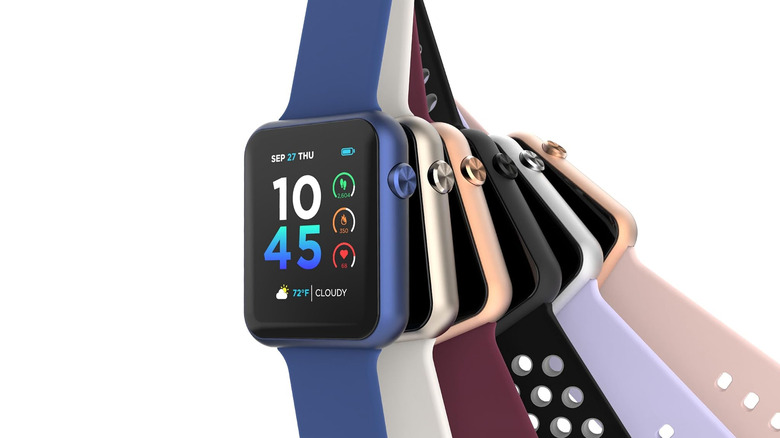What Is An iTouch Watch, And Are They Any Good?
We may receive a commission on purchases made from links.
Having a watch that can keep track of your steps, monitor sleep, field phone calls, check emails, and even pay for your lunch may not be for everybody, but smart watches have only become more popular over the years. That doesn't necessarily mean majority saturation, though, and to an extent that's due to these handy little tools being rather costly.
Not everyone can or is willing to spend $200 to $700+ on something that does the same thing a smartphone they already own can offer — minus some specific health and fitness tracking sensors. That's why cheaper (and less complex) alternatives like iTouch exist. But how well do iTouch smart watches stack-up next to more better-known watches from the likes of Apple or Google? Can they hold a candle to their costlier counterparts? And are they worth the price, even if it is a much more approachable dollar amount?
Answering those questions is a bit complicated, as, to a degree, you get what you pay for — so don't expect a $750 Apple Watch experience from a $95 iTouch watch. However, depending on what you actually want from a smart watch, this might be perfect for you.
What is an iTouch Watch?
In a general sense, iTouch watches are "budget" smart watches — devices that offer many (though not all) of the features touted by more well-known and costly models, but for a fraction of the price. All of iTouch Wearables' (the company) smart watches carry an MSRP under $100, with the exception of its Jillian Michaels Edition iTouch Air 4 that's regularly priced at $115, meaning even the most expensive model currently on the market is still less than half the cost of the least expensive modern Apple Watch or Google's cheapest Pixel Watch.
For most iTouch smart watches, you can expect to see a variety of health and fitness tracking tools, smartphone pairing (covering both Android and iOS), competitive battery life, weather notifications, notifications from a paired smartphone, and remote functions for cameras and music. Some may omit a feature or two based on age and specialization (as is the case with fitness trackers), but for the most part you can expect many of the same bells and whistles one would normally associate with any fitness tracker plus a few smart watch touches.
iTouch Watch benefits
Aside from the most obvious (and arguably most significant) perk of a much lower price point, most iTouch smart watches include a suite of built-in sensors and features. Older models like the iTouch Sport 3 can monitor your heart rate and let you know when it's elevated, serve as a pedometer, keep track of your body temperature, and give you reminders to hydrate along with hygiene assistance.
Newer models, such as the iTouch Air 4 and iTouch Sport 4, include pretty much the same features as the iTouch Sport 3, along with several more extras. Blood oxygen monitoring, multiple options for specific sports and workouts (for fitness tracking accuracy), remote control options for cameras and music, weather info, and notification pop-ups for things like incoming messages and calls (when connected to a smartphone). The Sport 4 also boasts IP68 water resistance.
One other aspect all iTouch smartwatches appear to have in common is about seven days of battery life on a full charge, which goes well beyond the 72 hour Low Power Mode maximum of the Apple Watch Ultra 2 and the 24 hours of battery life promised by the Google Pixel Watch 2.
iTouch Watch dowsides
As mentioned, there are some features you won't see on an iTouch Watch compared to something from Apple or Google and the like. All iTouch smart watches offer a color LCD touch screen but they don't quite go as far as to include a Retina or AMOLED display. They also lack the processing power of their more expensive counterparts, and only very specific models can take calls or let you respond to messages. Mostly, they notify you when a call or message (or social media notification) comes in, but you'll have to use your paired phone to respond.
Fitness tracking is also fairly limited somewhat with no heartbeat irregularity warnings, no fall detection, and no emergency calls. You won't be able to access any voice assistants with an iTouch smart watch, either, and other perks like tap-to-pay are absent as well. In other words, you won't find a fully-featured smart watch experience with an iTouch watch.
Tips for buying an iTouch Watch
Whether or not you're better off with an iTouch Watch as opposed to an Apple or Pixel equivalent is up to you to decide. If the aforementioned features you'll be missing out on are important to you, then you're probably better off saving up for what you really want rather than settling.
That being said, if you don't want or need quite so many bells and whistles, and would prefer something a little simpler that still offers plenty of options at a sub-$100 price, there are several iTouch models to choose from. As always, it's recommended that you do your homework before commiting to a purchase — to make sure the model you get does everything you want it to.
Most of iTouch Wearables' comparable models are priced the same across iterations, too (for example, the Air 4 versus the Air 3), so unless the latest model is more than you need there's not much reason to compare pricing. It mostly comes down to your own stylistic preferences, and whether or not you want to go with the Sport for its water resistant construction.




